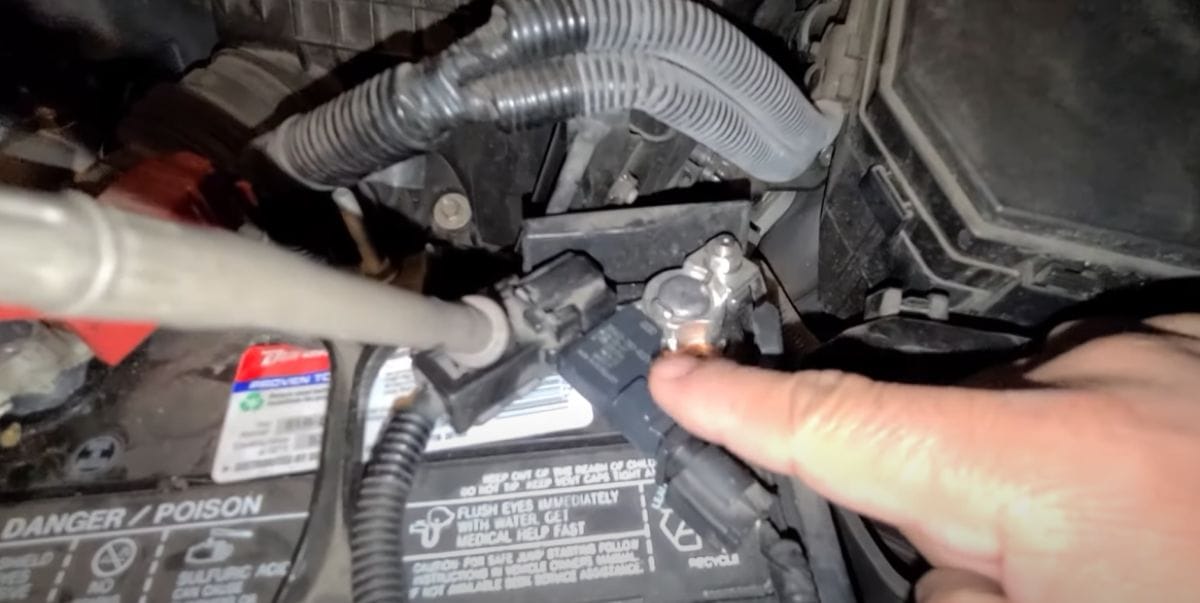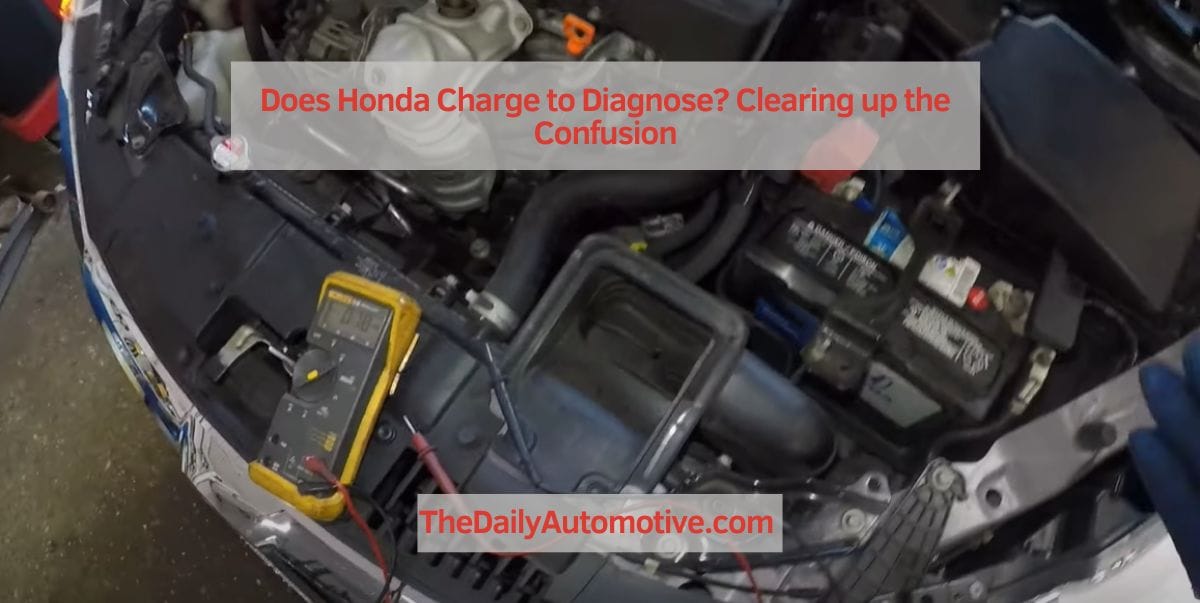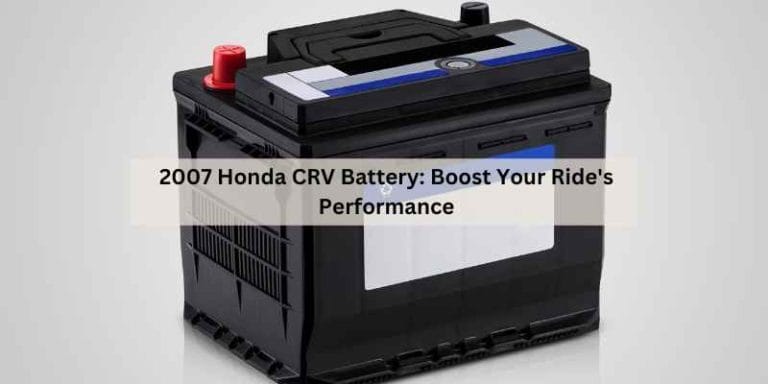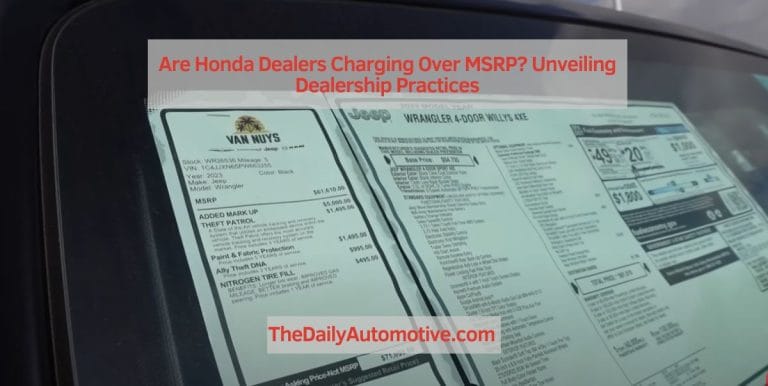Does Honda Charge to Diagnose? Clearing up the Confusion
Yes, Honda charges a fee to diagnose vehicle issues. Now, I will provide you with a well-rounded introduction to further explain the topic.
When you experience problems with your Honda vehicle, it’s essential to understand that diagnosing the issue requires the expertise of skilled technicians and the use of specialized diagnostic equipment. Honda, like many other car manufacturers, charges a fee to cover the time and resources involved in diagnosing the problem.
This fee helps ensure that qualified technicians thoroughly inspect your vehicle and identify any underlying issues accurately. By having your Honda professionally diagnosed, you can be confident that the problem will be identified correctly, allowing for efficient and effective repairs. We will delve into the topic of Honda diagnosis fees, exploring how they work and why they are necessary for maintaining the performance and reliability of your vehicle.
Understanding Honda’s Diagnostic Fees
Honda vehicles are known for their reliability and advanced technology. However, like any other vehicle, they may require diagnostic services from time to time. In this article, we will discuss Honda’s diagnostic fees and help you understand what to expect when it comes to diagnosing issues with your Honda vehicle.
What Is A Diagnostic Fee?
A diagnostic fee is a charge that car dealerships or service centers impose for the time and expertise required to diagnose a problem with a vehicle. When you bring your Honda to a dealership or authorized service center, the technicians will perform a series of tests, inspections, and evaluations to determine the cause of the issue or identify potential problems.
The diagnostic fee covers the cost of the technician’s time, the use of specialized equipment, and their expertise in diagnosing complex vehicle systems. It is important to note that the fee is typically separate from any repair or parts costs that may be needed to fix the identified problem.
Is Honda Charging For Diagnostic Services?
Yes, Honda charges a diagnostic fee for their diagnostic services. When you bring your Honda to a dealership or authorized service center, you can expect to pay a fee for the thorough and detailed analysis performed by their trained technicians. This ensures that you receive an accurate diagnosis and appropriate recommendations for any necessary repairs.
By charging for diagnostic services, Honda maintains the quality of their service and ensures that customers receive reliable and precise diagnostic information. This helps them effectively address any issues with your vehicle and provide reliable solutions.
How Much Does Honda Charge For Diagnostics?
The diagnostic fee charged by Honda may vary depending on several factors, including the location, specific dealership, and the complexity of the diagnostic procedure. However, it is important to understand that this fee covers the expertise of Honda’s trained technicians and the use of specialized diagnostic equipment to provide accurate assessments of your vehicle.
Typically, the diagnostic fee ranges from around $100 to $200, but it is always best to check with your local dealership or authorized service center for their specific pricing. While this fee may seem like an additional expense, it is an investment in receiving accurate and reliable diagnostic results for your Honda vehicle.
Remember, by paying the diagnostic fee, you are ensuring that experienced professionals diagnose your Honda correctly, helping to avoid unnecessary repairs and potentially saving you money in the long run.

Factors Influencing Diagnostic Fees
Honda’s diagnostic fees are influenced by several factors, including the complexity of the issue, the time required for diagnosis, and the dealership’s pricing policies. They may charge a fee for diagnosing problems with their vehicles.
Type Of Issue
When it comes to diagnostic fees, one of the primary factors influencing the cost is the type of issue your Honda vehicle is experiencing. Different issues require varying levels of expertise, time, and equipment to diagnose accurately. Major problems, such as engine malfunctions or electrical system failures, often require more comprehensive diagnostic procedures. These complex issues involve in-depth analysis of various subsystems, which can be time-consuming and require specialized equipment. Consequently, the diagnostic fee for such problems tends to be higher.
On the other hand, minor issues like a malfunctioning sensor or a simple software glitch may be easier to diagnose. Since these problems require less time and effort to troubleshoot, the diagnostic fee associated with them is typically lower. However, it’s important to note that even seemingly minor issues may involve hidden complexities that can only be identified through thorough diagnosis.
Labor And Equipment Costs
Labor and equipment costs constitute another significant aspect that impacts diagnostic fees. When diagnosing a Honda vehicle, mechanics invest their time and expertise in identifying the root cause of the issue. The more skilled and experienced the mechanic, the higher the labor costs may be. This is because their expertise allows them to quickly and accurately diagnose problems, ensuring a precise and effective solution.
Additionally, the equipment used during the diagnostic process also influences the overall cost. Sophisticated diagnostic tools, such as computerized scanning systems and specialized testing equipment, are often necessary for determining the precise underlying problem. These tools require costly maintenance, upgrades, and sometimes even specialized training to operate effectively. Consequently, the cost of utilizing such equipment is factored into the diagnostic fee.
Dealer Vs. Independent Mechanic
The choice between seeking diagnostics at a Honda dealership or an independent mechanic also affects the diagnostic fees you may encounter. Dealerships typically have higher overhead costs compared to independent mechanics. They invest in maintaining manufacturer-specific diagnostic equipment, training their staff, and maintaining a well-equipped facility. These factors contribute to the higher diagnostic fees charged by dealerships.
On the other hand, independent mechanics often have lower operating costs and may use aftermarket diagnostic tools instead of manufacturer-specific ones. As a result, their diagnostic fees tend to be lower compared to dealerships. However, it’s crucial to ensure that the independent mechanic you choose is experienced and knowledgeable about Honda vehicles. This ensures that accurate diagnosis and high-quality repairs are performed, saving you both time and money in the long run.
In conclusion, several factors influence the diagnostic fees for Honda vehicles. The complexity and severity of the issue, labor and equipment costs, as well as the choice between a dealership and an independent mechanic, all play a role in determining the overall cost. It’s essential to consider these factors when seeking diagnostics for your Honda, allowing you to make an informed decision and receive the necessary repairs without breaking the bank.
Alternatives To Paying Diagnostic Fees
When your Honda vehicle experiences a problem, it can be frustrating to have to pay a diagnostic fee just to find out what’s wrong. Luckily, there are alternatives to consider before shelling out your hard-earned money. By exploring these options, you may be able to troubleshoot the issue yourself, take advantage of warranty coverage, or even seek a second opinion.
Diy Troubleshooting
Before you rush to the dealership or an auto repair shop, it’s worth trying some do-it-yourself troubleshooting first. Many common car problems have simple solutions that you may be able to handle on your own. Here are some steps to take:
- Check for loose connections: Start by inspecting the battery terminals and other visible connections to ensure they’re secured tightly.
- Scan for error codes: Invest in an OBD-II scanner to detect any error codes that may be stored in your Honda’s computer system. These codes can provide valuable insights into the issue at hand.
- Inspect the fuse box: A blown fuse could be the culprit behind certain electrical problems. Refer to your vehicle’s manual to locate the fuse box and check if any fuses need replacing.
- Listen for unusual noises: Strange noises coming from your Honda can indicate specific problems. Pay attention to any rattling, squealing, or knocking sounds and try to identify their source.
- Research online resources: With the wealth of information available on forums and automotive websites, you may find step-by-step guides or video tutorials that can help you diagnose and fix the issue.
Warranty Coverage
If your Honda vehicle is still under warranty, you may be in luck. Warranty coverage often includes diagnostic services, which means you won’t have to pay extra for the initial evaluation. When contacting your Honda dealer or service center, be sure to inquire about the specifics of your warranty and how it applies to diagnostic fees. Keep in mind that warranty coverage typically applies to certain components or a specific duration, so check the details to ensure you’re eligible.
Seeking A Second Opinion
If you’re uncertain about the diagnosis you received or want to explore other options, don’t hesitate to seek a second opinion. Consulting another experienced technician can provide you with different insights and potentially save you from unnecessary expenses. Here are some steps to follow:
- Gather all relevant information: Make sure to collect any diagnostic reports or notes from the initial evaluation. This information will be crucial when seeking a second opinion.
- Research reputable repair shops: Look for certified Honda repair shops or reputable mechanics in your area. Read reviews and consider their experience and expertise.
- Explain the issue: When contacting the chosen repair shop or mechanic, clearly explain the problem you’re experiencing and mention that you’re seeking a second opinion.
- Discuss the diagnostic fee: Inquire about the cost of a diagnostic evaluation before making an appointment. Some shops may offer free or discounted second-opinion services.
- Compare the recommendations: Once you’ve received the second opinion, compare it with the initial diagnosis. Take note of any discrepancies or similarities and evaluate the proposed solutions.
By utilizing these alternatives to paying diagnostic fees, you can gain a better understanding of the issues your Honda is facing and potentially save money. Whether you choose to tackle the problem yourself, take advantage of warranty coverage, or seek a second opinion, being informed and proactive can go a long way in resolving the problem efficiently.
Conclusion
Honda does charge a fee for diagnosing your vehicle, but the exact amount may vary depending on the dealership and the specific issue. It’s important to contact your local Honda dealership and inquire about their diagnostic fees before bringing in your car.
Remember to stay proactive with regular maintenance to potentially avoid costly diagnostic charges in the future. Keep your Honda running smoothly and efficiently with regular check-ups and servicing.







